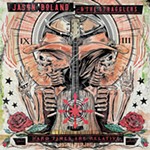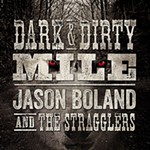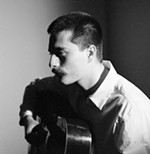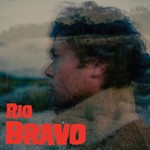Beyond the Bourbon Legend
Jason Boland, back in the saddle
By Doug Freeman, Fri., April 10, 2009
Cowboys Dancehall, 70,000 brightly lit square feet rising out of the construction-plagued crux of I-35 and Loop 410 in San Antonio, stands out like a massive casino cutting across the horizon. Inside, the scene is even more surreal, with the complex divided down the middle into a rodeo arena on one side and vast commercial dance floor on the other.
A diamond of fire ignites through the dirt of the rodeo ring as the Friday night bull riders are introduced. Most of the cowboys are young and green, easily bested by the beasts after only a couple of brutal seconds that seem to last well beyond the actual clocked time. Drinking and yelling, the crowd presses up against the fence to follow riders through a rapid dance of tenuous balance, white-knuckle control, and willed flexibility to roll with each thundering kick and stomp.
On the other side of the room, another cowboy is gearing up for his ride. Austin's Jason Boland & the Stragglers spread out across the bottom level of a giant three-tiered stage, Boland's humble stance a conspicuous contradiction to the sterile dance hall whose walls are plastered in a fake facade of an Old West town, poker and pool tables scattered amid bars and a mechanical bull in the corner. Despite the setting, there are no gratuitous theatrics to his show, just Boland's cowboy hat pulled down low or tipped to the fans who have largely abandoned the dance floor to crowd in front of the stage and sing along.
Boland's deep, clipped drawl cuts with a natural authenticity and genuine emotion, his easy rolling melodies couched in narratives that pull from a reality bucking the songwriter at every turn. Since his 1999 debut, Pearl Snaps, the Oklahoma native has taken his share of falls, Boland's quick rise on the Texas country scene accompanied by a hard-partying lifestyle that nearly killed him. Boland, 34, has managed to hold on and is now writing the best material of his career, his most recent album, Comal County Blue, ringing with a clear-eyed honesty that eschews both sentimentality and regret.
No One Left to Blame
"You write about what you know, and it's a bit of art imitating life," says Boland in his thick, languid accent. "But the emotions of songs can easily get bigger than people. I've always tried to relate to emotion and mood."
Sitting outside Ruta Maya coffeehouse on South Congress, not far from his new South Austin home, Boland's mouth slices a razor-thin smile into the rough stubble on his checks. Under a ball cap, his eyes hold a penetrating intensity through their narrowed slits. As he trades stories with Stragglers' fiddler Noah Jeffries, he shrugs off self-deprecating jokes with laid-back, good-old-boy charm.
Born in the small town of Harrah, Okla., Boland nearly joined the seminary out of high school but attended Oklahoma State University instead. It was there, in 1990s Stillwater, that Boland fell into the burgeoning Red Dirt music scene.
"Here was this little town, and the songs I was hearing and the guys that were playing 'em were just blowing us all away," marvels Boland of his OSU days. "There were all these great afterparties at a place called the Farm, where people would sit and pick, and the songwriters from around there were impressive, guys like Mike McClure from the Great Divide. Cody Canada was starting to come around then, but there were also Bob Childers, Tom Skinner, the Red Dirt Rangers, Jimmy LaFave, and the Medicine Show.
"I think the most appealing thing was really their hippie qualities. They were really just tuned in, turned on, and dropped out. They preached lives of love and no fear: 'Write music, and don't worry about things.'"
By 1998, Boland had formed the Stragglers and the next year released his Lloyd Maines-produced debut. The album placed Boland at the forefront of the next generation of popular Okie and Texas country kickers, a crop of artists like Cross Canadian Ragweed, Kevin Fowler, and Pat Green that melded the jammin' Red Dirt sound from the North with the Robert Earl Keen inspiration from the South.
The combination made for huge crowds and hard parties. Boland moved to Austin in 2002 after the release of his sophomore disc, Truckstop Diaries, and eventually settled in New Braunfels. Yet even as he ingratiated himself with the Texas music scene, Boland distanced himself from his musical contemporaries and their party anthems with a brooding volatility aligning him with the outlaw legacy of Waylon Jennings in more than simply his deep vocals.
"In those days, it was party balls-to-the-walls all of the time," admits Jeffries, who joined the band in 2003, just as they had traded their van for the infamous blue tour bus.
"Everybody was in bad shape," agrees Boland. "It was just a constant party. It was fun at first. Some of the shows weren't even violently awful. They were just normal garage band bad. I would play whole shows and not even hit my tuner."
In 2005, the Stragglers' hard-charging lifestyle finally caught up with them. After years of relentless drinking, Boland's body finally buckled under the strain, and he had a seizure on the side of the highway.
"I was trying to white-knuckle it one time and quit drinking, and I didn't know you could seize up," he remembers. "I didn't know anything about the DTs. I thought you felt bad, and that was it. It was after one particularly long bender on the blue bus, and it broke down in Corpus. I remember taking my last shot, and we drank up until Monday morning. Tuesday was just a nightmare, and Wednesday I made it out to Cross Canadian Ragweed's record release.
"I was hanging out backstage, saw the bugs, and as I was drivin' home, something wasn't right. I started feeling real twitchy, so I pulled off the road and got outside the truck. I woke up, and the ambulance was there. I didn't know what was going on."
The Party's Not Over
Boland entered rehab at the Sierra Tucson Treatment Center that October. He emerged sober with a renewed sense of purpose, releasing his fourth studio album, The Bourbon Legend, in 2006, which opened with the hard double-shot of reality from "Last Country Song" and the LP's title cut.
"I don't have an off switch with [alcohol]; it agrees with me too well," acknowledges Boland with a wry grin. "It does everything I want it to do. It makes me stop thinkin', just relax, and not care. It makes a yee-haw moment. That's what alcohol's about, only you still like doing the same things, you still observe the same things. You worry about losin' the muse, but rehab was a welcome break. I was ready for it."
Sobriety has hardly held the honky-tonker back, instead allowing him to craft his most mature and poignant collection of songs to date with last summer's Comal County Blue. "Something You Don't See Everyday" and "The Party's Not Over" prove Boland can still pen a barroom ballad with the best, while the title track and "Bottle by My Bed" mine his struggles to draw a weary hope.
Yet even as he took the reins of his life and career, fortune kicked back. Last year, Boland and his wife divorced. On the day of Comal County Blue's release, he was forced to undergo surgery to remove a polyp from his vocal chords.
"By that point, it really didn't even feel like anything," says Boland of the string of setbacks. "We knew the album was going to come out August 26, so when I went and got my surgery schedule and they said August 26, I just said: 'Exactly. This is making a point. Go with it. Stop, shut up, and listen.' It was good for everybody. I wouldn't change it if I could."
Boland takes his hits with the same casual nonchalance with which he accepts his successes. It's an attitude that's allowed him to wrangle a level of mainstream country currency without compromising his maverick sensibility. Last week he even garnered a Lone Star Music Award for Best Song for "Comal County Blue."
"Most of it's just footnotes and jokes, because we all know how crazy all this is," he laughs. "Everybody knows that one day you're gonna open for somebody, and someday somebody's gonna open for you. And if you get bent out of shape, then you're just in it for fame anyway and weren't in it to go play a good show and make some fans enjoy the ticket that they bought. But if you're being true to yourself, that's about the only thing you can do in music."










